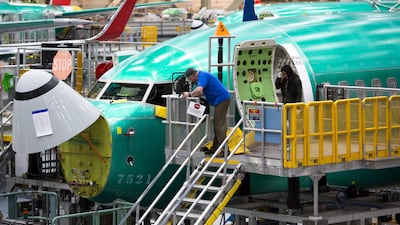Boeing delivered only 14 aircraft in October, its lowest monthly delivery count since November 2020, with operations heavily affected by a strike by its largest union.
During the height of the strike last month, the aerospace company delivered nine 737 Max jets, four 787 Dreamliners and one 767 freighter, the US plane maker said on Tuesday. The company also reported 63 aircraft orders in October, with no cancellations.
After the announcement, Boeing shares dropped 2.54 per cent to trade at $145.17 at 1.30pm New York time. The company’s stock has dropped more than 42 per cent since the start of the year, giving it a market capitalisation of more than $109 billion on Tuesday.
After the strike's onset on September 13, when almost 33,000 employees walked out, Boeing managed to meet some of the orders by using non-unionised staff. From the strike's beginning to the end of October, it delivered 24 aircraft, including 17 Max jets and six Dreamliners.
This month, Boeing factory workers agreed to end the more than seven-week strike after union members accepted the latest contract offer. The IAM District 751 union and W24 Machinists said on November 5 that 59 per cent of workers accepted Boeing's latest contract, which included an offer of a 38 per cent pay increase spread over four years.
As workers return, the company has to evaluate safety hazards, re-establish machinist duties and safety protocols, and verify that all training certifications are up to date, a company spokesman said.

Boeing’s strike allowed rival company Airbus to boost its market share. Last month, the European plane maker delivered 62 aircraft, including 48 of its in-demand A320neo narrow-body models.
By the end of October, Boeing had delivered 305 jets so far this year, while Airbus completed 559 deliveries.
“Our business is in a difficult position and it is hard to overstate the challenges we face together,” Boeing’s president and chief executive Kelly Ortberg said last month.
“Beyond navigating our current environment, restoring our company requires tough decisions and we will have to make structural changes to ensure we can stay competitive and deliver for our customers over the long term.”
Mounting financial constraints
As it battles mounting financial pressures amid growing losses, Boeing has announced a dual stock offering that could raise nearly $19 billion.
Last month, Boeing also entered into a $10 billion credit agreement with banks and said it plans to raise up to $25 billion through stock and debt offerings as it seeks to shore up its balance sheet.
The company is dealing with a series of crises related to the safety of its aircraft and manufacturing processes. On October 8, the US aviation regulator issued a safety alert to airlines, warning of potential risks related to restricted or jammed rudder movement on certain Boeing 737 aircraft.
It became embroiled in a safety and quality crisis after a door panel blew out mid-air on a 737 Max jet in January, prompting the US Federal Aviation Administration to increase oversight of the company.
On October 23, Mr Ortberg unveiled a four-point strategy to turn around the plane maker's fortunes after its losses nearly quadrupled to more than $6 billion in the third quarter.
It reported a net loss of more than $6.17 billion in the three months to the end of September, growing from a $1.64 billion loss in the same period last year. Revenue dropped about 1.5 per cent on a yearly basis to $17.84 billion.
“Clearly, we are at a crossroads: the trust in our company has eroded, we’re saddled with too much debt and we have had serious lapses in our performance across the company, which have disappointed many of our customers,” Mr Ortberg said last month.
The company has announced it will cut 17,000 jobs, or about 10 per cent of its global workforce, and delay the first delivery of its 777X jet by one year, pushing back its largest wide-body aircraft by about six years.


